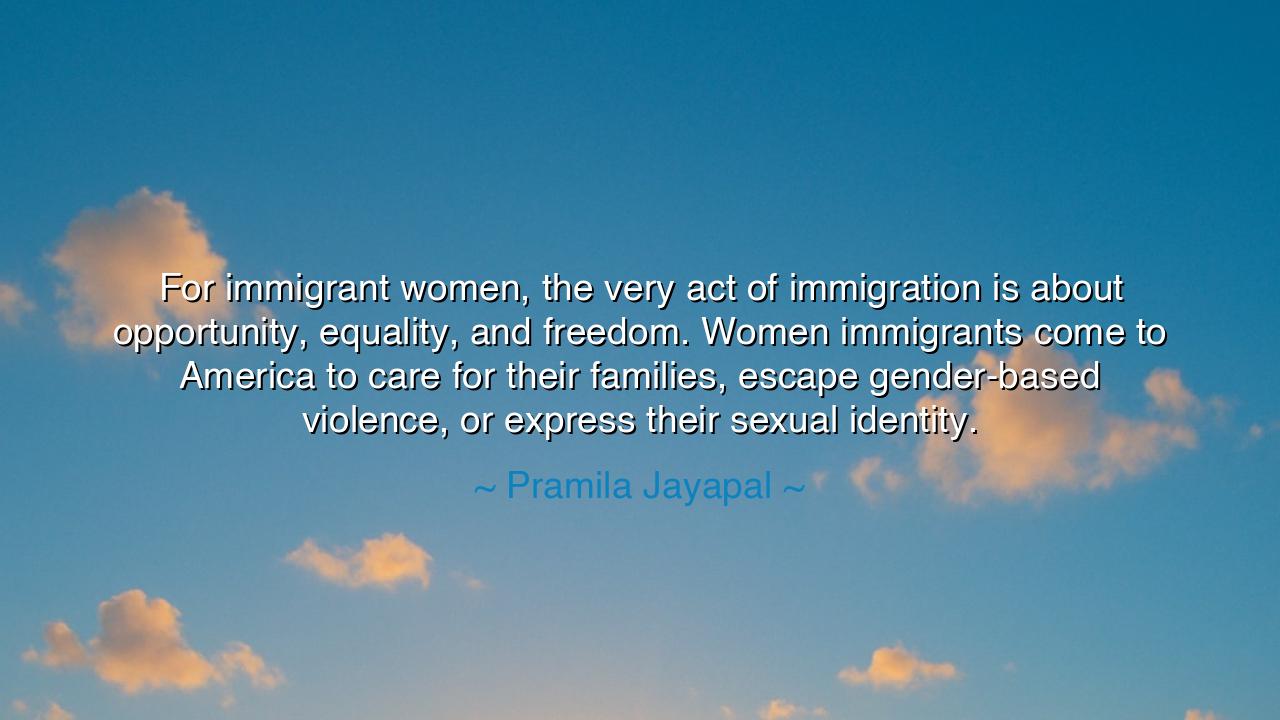
For immigrant women, the very act of immigration is about
For immigrant women, the very act of immigration is about opportunity, equality, and freedom. Women immigrants come to America to care for their families, escape gender-based violence, or express their sexual identity.






Pramila Jayapal’s words rise with the strength of lived truth: “For immigrant women, the very act of immigration is about opportunity, equality, and freedom. Women immigrants come to America to care for their families, escape gender-based violence, or express their sexual identity.” This is not a distant reflection but a cry rooted in struggle, sacrifice, and hope. To leave one’s homeland is no light decision, but for women, it is often an act of courage against forces that seek to silence, diminish, or destroy them. In their journey, immigration itself becomes not just a crossing of borders, but a declaration of life, dignity, and unyielding will.
She names opportunity first, for opportunity is the seed from which all futures grow. Many immigrant women come seeking what was denied to them in their homelands: the chance to study, to work, to provide for their children. Opportunity is the soil where dreams are planted, and without it, the spirit withers. To step onto new shores is to claim the right to plant those seeds anew, even in foreign earth, even at great cost. The ancients knew this hunger well, for in every age, people have fled famine, oppression, and stagnation, carrying little but hope for a better life.
The second pillar she names is equality. For in many lands, women are denied the right to speak, to vote, to work, or even to walk freely. The journey to America, though fraught with hardship, is often a journey toward a vision of equality, however imperfectly realized. Consider the story of Emma Lazarus, the poet whose words are carved into the Statue of Liberty: “Give me your tired, your poor, your huddled masses yearning to breathe free.” That statue has stood for generations as a promise of equality to those cast aside by old worlds. For women especially, the act of immigration becomes a protest against inequality, a refusal to accept the role of the voiceless.
The third treasure Jayapal names is freedom. Freedom is more than the lifting of chains; it is the ability to live fully as oneself. Many immigrant women come not only to provide for their families, but to escape gender-based violence or to live openly in their sexual identity. Their migration is not simply geographical—it is spiritual. To flee violence is to declare: “I will not allow my life to be crushed.” To embrace one’s identity in a freer land is to say: “I will live as who I truly am.” These acts are not only personal victories but heroic deeds, for they defy cultures of silence and shame.
History bears many such examples. Think of the Jewish women who fled Europe during the Holocaust, carrying children in their arms, seeking a land where they would not be slaughtered for their faith. Or consider Marsha P. Johnson, an activist and immigrant of identity in her own right, who fought for LGBTQ+ rights in America, embodying the struggle to live freely and openly. Each of these lives testifies to Jayapal’s truth: immigration is not merely a passage of geography, but an exodus toward freedom.
The lesson that emerges is timeless: immigration is courage. It is not an act of weakness, but of strength; not surrender, but defiance against forces that deny opportunity, equality, and freedom. Women who leave behind everything familiar to protect their families or to embrace their true selves are not victims—they are pioneers. They carry within them the same spirit as the ancients who crossed deserts and oceans, believing that somewhere beyond the horizon, there lies a place where the soul can breathe.
Therefore, let each who hears this teaching act with compassion. Do not look upon immigrant women with suspicion or scorn, but with honor. Support their struggles, defend their dignity, and learn from their courage. In your own life, too, imitate their spirit: when you are denied opportunity, seek it; when you face inequality, resist it; when your freedom is threatened, fight for it. For in their journey is the universal human story—the longing to live not in chains, but in truth.
Thus, Pramila Jayapal’s words are not only about immigrant women, but about the eternal struggle of the human heart. They remind us that the quest for opportunity, equality, and freedom is not confined to nations or genders, but belongs to all. And if we honor their courage, then perhaps we, too, may build a world where no one must flee for safety, because all may dwell in dignity.






AAdministratorAdministrator
Welcome, honored guests. Please leave a comment, we will respond soon